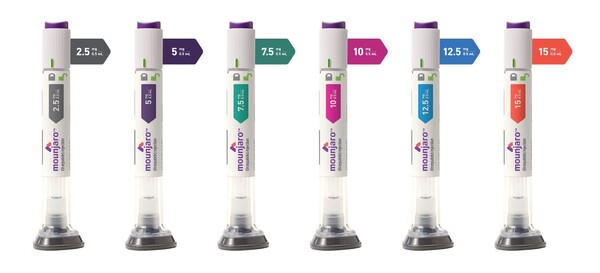Eli Lilly’s Mounjaro (tirzepatide), the so-called dream drug to treat diabetes and obesity, drawing global attention, has won approval from the Ministry of Food and Drug Safety.
However, due to the rapid increase in demand in developed markets, including the U.S., it is unclear whether there is enough supply for domestic use. Therefore, it is unclear when it will be available in Korea.

The MFDS approved Mounjaro for monotherapy and combination therapy as an “adjuvant to diet and exercise therapy to improve glycemic control in adults with type 2 diabetes Wednesday.
Mounjaro is a GIP/GLP-1 receptor agonist administered by subcutaneous injection once a week. Its main active ingredient, tizerpatide, has garnered significant attention by demonstrating the highest blood glucose lowering and weight loss effect among all diabetes and obesity drugs developed to date.
In the SURPASS clinical program in patients with type 2 diabetes, Mounjaro demonstrated significant glycemic (HbA1c) reduction compared to the control group, both as monotherapy and combined with metformin, sulfonylureas, SGLT-2 inhibitors, or insulin. Based on this, the drug has won approval around the world.
In particular, tirzepatide has shown superiority in glycemic control and weight loss in a head-to-head clinical trial (SURPASS-2 study) against its strongest competitor, Novo Nordisk's semaglutide (Ozempic), and has been labeled the “best in class” for this reason.
Recently, many studies have shown that weight loss can help people with type 2 diabetes achieve remission and lead to a cure. Mounjaro is also considered the most promising drug to achieve this.
It is noteworthy that Mounjaro has obtained approval here earlier than expected to compete with Ozempic in the domestic market.
However, Ozempic is ahead in the reimbursement stages. Novo Nordisk received approval for Ozempic in late April last year and applied for insurance benefits from the Health Insurance Review and Assessment Service (HIRA). This past February, the application got conditional approval from the pharmaceutical evaluation committee, and the only question is whether Novo Nordisk will accept the price of Ozempic below the government’s assessment.
However, Novo Nordisk has also been experiencing supply disruptions due to a surge in demand for Ozempic in the global market and has been unable to keep up with production. So, it is unclear whether it will be supplied to the domestic market in time, even if it is granted a domestic reimbursement.
The situation is the same with Lilly.
“While the headquarters focus on improving its supply capacity for Mounjaro, there is significant unmet demand for people living with diabetes worldwide,” a Lilly Korea official said. “Lilly is continuing to invest in its manufacturing and supply capacity and is on track to double its capacity by the end of the year with the addition of a manufacturing facility in North Carolina and additional work and expansion in other regions.”
Lilly’s headquarter office is considering many options to increase its supply capacity more quickly and bring Mounjaro to market more quickly outside of the U.S. Lilly is also committed to getting Mounjaro to people with type 2 diabetes in Korea, the official added.
However, the official declined to comment on plans for reimbursement application and an estimated timeframe for the domestic launch.
Moreover, given the recent disruption in Lilly Korea’s supply of its GLP-1 receptor agonist Trulicity (dulaglutide) in the domestic market, local diabetes experts predict that the launch of Mounjaro will not be easy.
“It is expected that the supply of Trulicity will be difficult to meet the market demand,” Lilly Korea said in a recent notice to hospitals in Korea. “The supply shortage of Trulicity will occur in July, and the domestic supply is expected to be unstable throughout the year's second half.”
Professor Kim Dae-jung of the Department of Endocrinology at Ajou University Hospital expressed his regret over the Korean market's sorry status, falling out of favor with global pharmaceutical companies while sharing the content on his Facebook page.
“I wonder if Korea is such an important market in the global pharmaceutical industry these days,” he said. “There are many out-of-stock issues for diabetes drugs, and Korea always takes a back seat in continuous glucose monitors and insulin pumps, too.”
He added that he was unsure when Novo Nordisk’s semaglutide would arrive in Korea while neighboring Japan had already used it.
"It is a sad reality that we can’t help but resort to global pharma giants’ benign intention,” Kim said.
Related articles
- GLP-1 analogs, new trend in obesity treatment, become even more effective
- [Interview with Global Pharma Leaders] 'Korean government should open drug pricing review data to pharmaceuticals'
- Regulator keeps close eye on GLP-1 weight loss drugs' possible link to suicidal thoughts
- GI Biome, ProGen to work on next-gen obesity treatment
- How will Wegovy fit into obesity society’s guidelines in Korea?

